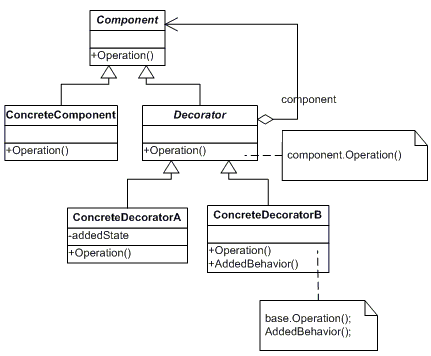重看Decorator Pattern,联想到Delegate传递及Flags Enum--欢迎拍砖!
2013-11-30 21:53 stevey 阅读(325) 评论(0) 收藏 举报话说装饰模式(Decorator)的动机是“动态地给一个对象添加一些额外的职责。就增加功能来说,Decorator模式相比生成子类更为灵活。[GOF 《设计模式》]”。再次学到该模式,有感,联想到Delegate和Flags Enum。Delegate也可实现在已有功能上动态添加新功能,有点”装饰“的意图,Flags Enum可以进行组合使用。如果对装饰模式不熟悉,请移步大神博文http://terrylee.cnblogs.com/archive/2006/03/01/340592.html。本文描述该模式的相关思考,不正之处,请大神指点拍砖!谢谢
该模式的UML图: ,Decorator抽象,既继承Component又组合引用Component,为什么需要这样呢?从该模式的具体代码看到,装饰之上可以继续装饰,故需要引用一个装饰,为什么有需要继承呢,感觉装饰需要一个抽象吧。
,Decorator抽象,既继承Component又组合引用Component,为什么需要这样呢?从该模式的具体代码看到,装饰之上可以继续装饰,故需要引用一个装饰,为什么有需要继承呢,感觉装饰需要一个抽象吧。
现在来假设一个场景,有一个现有的对象,如下:
public class Component { public void Operation(string msg) { Console.WriteLine("Compent.Operation。hi,:"+msg); } }
该操作不是可override的,那怎么使用装饰模式来扩展新功能呢?这里给出装饰模式的“变形代码”
public class ComponentWrapper { public virtual void Operation(string msg) { Component m_Component = new Component(); m_Component.Operation(msg); } } public class ComponentWrapper1 : ComponentWrapper { private ComponentWrapper m_decorator; public ComponentWrapper1(ComponentWrapper decorator) { m_decorator = decorator; } public override void Operation(string msg) { m_decorator.Operation(msg); Add(msg); } public static void Add(string msg) { Console.WriteLine("ComponentWrapper1 added"); } } public class ComponentWrapper2 : ComponentWrapper { private ComponentWrapper m_decorator; public ComponentWrapper2(ComponentWrapper decorator) { m_decorator = decorator; } public override void Operation(string msg) { m_decorator.Operation(msg); Add(msg); } public static void Add(string msg) { Console.WriteLine("ComponentWrapper2 added"); } }
//调用代码
ComponentWrapper d = new ComponentWrapper();//未装饰 ComponentWrapper d1 = new ComponentWrapper1(d);//装饰上功能1 ComponentWrapper d2 = new ComponentWrapper2(d1);//装饰上功能2 d2.Operation("stevey");
上面代码中,ComponentWrapper 作为装饰的基类,对已有功能进行包装,在装饰1中继承装饰基类又包含一个装饰。可能说包装感觉更形象一点,一层一层的包装,或者说人穿的衣服也是一层一层的,哈哈。可以看到,一个装饰对象就作为一个”功能集“整体,实际上是一个引用装饰链,调用依次传递到顶端。由此联想到,功能也可以追加,功能也可以做成像链式依次执传递。遵循上面场景的方法契约,于是就凭着感觉写出如下code:
public static class ComponentExtension { /// <summary> /// 在已有操作之后加上新操作 /// </summary> /// <param name="action">原操作</param> /// <param name="otherAction">新操作</param> /// <returns></returns> public static Action<string> After(this Action<string> action,Action<string> otherAction) { return (msg) => { action(msg); otherAction(msg); }; } public static Action<string> Before(this Action<string> action, Action<string> otherAction) { return (msg) => { otherAction(msg); action(msg); }; } }
调用代码:
//使用delegate装饰新功能 Action<string> action = new Component().Operation; Action<string> wrapper1 = action.After(ComponentWrapper1.Add);//装饰上功能1 Action<string> wrapper2 = wrapper1.After((msg) =>//装饰上功能2 { Console.WriteLine("wrapper2 added"); }); wrapper2("hello"); Console.WriteLine("*****************************"); // Action<string> wrapper3 = wrapper1.After(wrapper2); wrapper3("(原功能+功能1)+{(原功能+功能1)+装饰上功能2}");//在已有的装饰整体上加上另一个装饰
上面的代码可以链式,其他不解释了,代码是最直接的意思表达,在一个功能上继续包装一个功能,得到的就是一个装饰,可以作为整体,继续装饰。。。貌似比模式轻量级点不。
标记枚举,也有点”装饰“的味道,MSDN上的代码:
[Flags] enum Days2 { None = 0x0, Sunday = 0x1, Monday = 0x2, Tuesday = 0x4, Wednesday = 0x8, Thursday = 0x10, Friday = 0x20, Saturday = 0x40 } //Flags Enum // Initialize with two flags using bitwise OR. var meetingDays = Days2.Tuesday | Days2.Thursday; // Set an additional flag using bitwise OR. meetingDays = meetingDays | Days2.Friday; Console.WriteLine("Meeting days are {0}", meetingDays); // Output: Meeting days are Tuesday, Thursday, Friday // Remove a flag using bitwise XOR. meetingDays = meetingDays ^ Days2.Tuesday; Console.WriteLine("Meeting days are {0}", meetingDays); // Output: Meeting days are Thursday, Friday
就写到这里吧,感觉有点语无伦次,不在状态,大家就将就看吧。算是一点装饰模式的读后感,欢迎大家讨论,不正之处,还请指出,谢谢!

 浙公网安备 33010602011771号
浙公网安备 33010602011771号